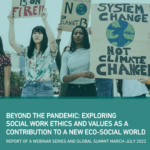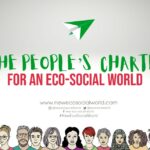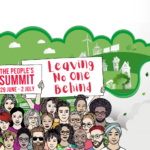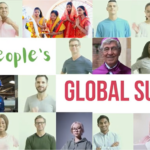Home › Forums › Live Open Mic Forum › Values for transitioning to an eco-social world
- This topic has 25 replies, 14 voices, and was last updated 1 year, 9 months ago by
Rose.
-
AuthorPosts
-
July 1, 2022 at 9:53 am #7291
David N Jones
ModeratorThe description of soft systems methodology appears to resonate strongly with the reality of social work practice in many contexts – at a micro and macro level.
July 1, 2022 at 9:59 am #7292Sylvia
ParticipantHello,
I have read with interest the other posts.When trying to talk about how we are linked via the ecosystem and each entity in that network relies on others for their life I find that English lacks a good vocabulary. My colleague suggested ecokin (ecological kin) to be able to express the idea that we are related to the other entities in nature.
Another concept I find useful is solastalgia (https://climatepsychologyalliance.org/handbook/484-what-is-solastalgia) because too often the fact that people can feel a strong tie to place is over looked. We can have a relationship with where we live.
I also use eco-grief and eco-anxiety.
It would be interesting to know of other ways we talk about our attachment to and integration with the natural world.
Sylvia Ramsay Griffith University Australia
July 1, 2022 at 1:58 pm #7311MARIA JESUS
ParticipantThank you, Richard for sharing with us your interesting reflections!
July 1, 2022 at 2:03 pm #7312MARIA JESUS
ParticipantThank you for remembering the philosopher Glenn Albrech who uses the world “solastalgia” to refers to the distress caused by environmental change.
July 1, 2022 at 3:38 pm #7341Richard
Participantthank you, Jane. I am not familiar with SSM but now I want to. I did a brief look at the link. Reference to soft caught my eye immediately. My work at UCalgary and community service work in suicide prevention led to the university (finally) agreeing to invest in our “soft science” work in suicide prevention (non we call it suicide-safer living). The university helped us develop LivingWorkv Education, the first (or close to the first) social enterprise company in suicide intervention training. We chose to go this social purpose route because of the uncertainty of longterm commitment of gov’t support and taxpayer criticisms when they think their $$ are going to other people or regions. It was an experiment to see if we (when I say We, I refer to 4 start-up partners from social work, psychiatry, psychology) to see if we could successfully use a business model to sustain a social purpose mission initiative. Our bottom line was aimed at large-scale dissemination of suicide safer training. so far it has worked out fairly well. LivingWorks will celebrate its 40th anniversary in 2023. We have national offices in 3 countries (Canada, America, Australia) and a network of over 10,000 locally/community-based trainers in more than 30 countries. We have indigenized cultural context and language versions serving Inuit, Maori, Aborigine, Norwegian, Lithuanian, south Korean populations. The most recent is I-ASIST in Australia between Univ QLD, LW and participatory action input. One of the unexpected spin-offs of our early work (80s and 90s) was an invitation by the UN social policy division to organize, host, fundraise an interregional meeting of representatives from 12 countries (Canada, America, Australia, Finland, Netherlands, Nigeria, UAE, Japan, China, India, Estonia, Hungary) to draft a UN Guideline for the development and implementation of national suicide prevention strategies that was published in 1996 and guided several countries in the development of their suicide prevention strategies. The original UN request was based on the false notion that suicide was a mental health problem and looked after by WHO. They realized from a document we submitted in response to a meeting by Ministers of social Welfare on the future of developmental social welfare that suicide was an intersectoral problem, not only a mental health problem. We were asked to help correct the misconception. Our meeting in Calgary in 1993 was a bit like this important 4-day summit and its Charter process to have a working draft at the end. We had a 7-day meeting in Canada to draft and submit to the UN, Out of the rich diversity of the participants and diverse attitudes and beliefs about suicide, we meant the deadline.
I was intrigued with the SSM process and its close fit with David Bohm’s belief and practice in deep dialogue that allowed for solutions to arise out of the dialogue. I have been a follower of his work for many years and continue through an association with the Pari Center in Italy that is keeping the importance of his work alive and ongoing. Leroy Little Bear from the Blackfoot Nation in southern Alberta is an active participant with the Pari Centre and the work of understanding and respecting the convergence of 20th-century science (especially quantum developments) and indigenous science/knowledge. A recent article on this emerging convergence had a headline along the line of “Western science is finally starting to catch up with indigenous science and knowledge”.
July 1, 2022 at 7:05 pm #7350David N Jones
ModeratorSoft systems, at first sight, looks like a methodology that reflects the reality of social work decision making.
July 1, 2022 at 7:19 pm #7352David N Jones
ModeratorJuly 1, 2022 at 7:51 pm #7364Richard
ParticipantThanks David, that’s the article Here’s another one of interest to this chat and other summit participants
July 1, 2022 at 9:12 pm #7368Richard
ParticipantHere’s an excerpt from a recently submitted manuscript that refers to Nicholas’s article.
….Building on the shoulders of giants, a well-known quote attributed to Newton, means that the part originally started from still exists, but now it is smaller, forming a smaller part of a broad view canopy. Some have called that broad view canopy a catching up of Western science with Indigenous knowledge that has been known for a long time (Nicholas, 2018). It opens the opportunity for a co-evolution of Western science and longstanding Indigenous knowledge systems, recognizing both as necessary for building a better future (Mazzocchi, 2020)…..
Mazzocchi, F. (May 2020). A deeper meaning of sustainability: Insights from indigenous knowledge. The Antropocene Review, 7(1):77-93.Nicholas, G. (2018, February 14). It’s taken thousands of years, but Western science is finally catching up to traditional knowledge. The Conversation Canada. Retrieved April 15, 2022
July 2, 2022 at 4:42 am #7378Richard
ParticipantI just received this link from colleagues in New Zealand who have been working with whole system ideas and projects. It might be something of interest in addition to the SSM link that Jane shared earlier today. For more on the work of the colleagues involved go to their About menu,
July 2, 2022 at 4:54 am #7379Rose
Participantreally great contributions to this topic – very exciting to read the thoughts and comprehensive submissions on our values – core to our professional identity – thanks everyone so far – anyone have any further last thoughts?
-
AuthorPosts
- The forum ‘Live Open Mic Forum’ is closed to new topics and replies.






